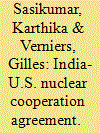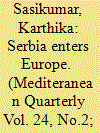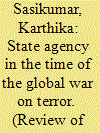| Srl | Item |
| 1 |
ID:
123216


|
|
|
|
|
| Publication |
2013.
|
| Summary/Abstract |
The U.S.-India civil nuclear energy agreement triggered a contentious debate in India from 2005 to 2008. Regional political actors played crucial and unanticipated roles in the debate. We present explanations for the positions adopted by the main actors and the level of contention. We find that parties' positions were driven not by ideology but by the compulsions of coalition politics.
|
|
|
|
|
|
|
|
|
|
|
|
|
|
|
|
| 2 |
ID:
120905


|
|
|
|
|
| Publication |
2013.
|
| Summary/Abstract |
In 2009, citizens of Serbia were finally allowed to make short trips to Schengen zone countries without visas. This represented a victory for the regime in Belgrade. A whole generation of Serbians had been held back from European travel by the visa requirement that was introduced as Yugoslavia disintegrated. However, this victory came at a price. Schengen countries worried that the lifting of the visa barrier would trigger a flood of illegal workers and asylum seekers from Kosovo. The Serbian government, which considers Kosovo to be an autonomous province, had to come up with an expedient solution to reassure wealthier European countries that allowing Serbians to "enter" would not open the gates to a large number of problematic visitors. Eventually, Belgrade agreed to restrict the privilege of visa-free travel for residents of Kosovo, formally differentiating Kosovar citizens from "normal" citizens. The imperatives of international mobility have forced a country, in a sense, to redraw its boundaries and to acknowledge a different status for a section of its population from a province that it continues to claim. This essay unpacks the puzzle of why supporters of the "integral Kosovo" position in Serbia resigned themselves to the compromise. The central argument is that states seek to secure mobility not only for economic reasons but also to mark themselves as normal, respectable members of the international community. Serbia's visa waiver decision provides a lens with which to view issues of mobility and national identity in one of the most complex and divided regions of the world.
|
|
|
|
|
|
|
|
|
|
|
|
|
|
|
|
| 3 |
ID:
097917


|
|
|
|
|
| Publication |
2010.
|
| Summary/Abstract |
The evolving international counter-terrorism regime obliges and permits countries to make changes in their domestic and foreign policies. At the same time, policy-makers in national capitals respond creatively to the global regime. By examining India's response to the evolving international regime on terrorism, I will demonstrate the mechanism through which the regime is influencing Indian policy: by setting up an identity that the country can aspire to. Further, by highlighting the leveraging of regime norms by the Indian state to further its own projects, I will show that states are not restricted to either passively receiving and complying with international norms on the one hand, or rejecting them on the other.
|
|
|
|
|
|
|
|
|
|
|
|
|
|
|
|